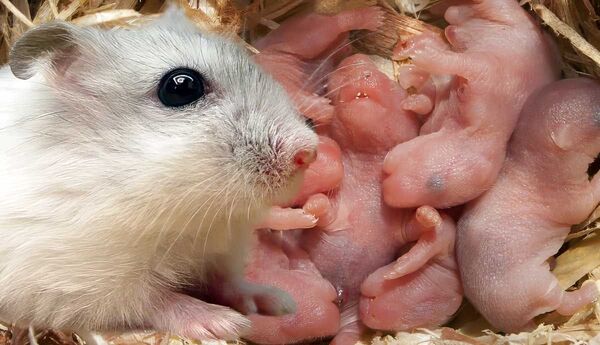Table of Contents:
When your hamster unexpectedly becomes pregnant, it can be overwhelming. Knowing how to care for the mother hamster and her babies is crucial to their well-being. In this guide, we’ll walk you through everything you need to know about hamster pregnancy, birth, and baby hamster care.

Before your hamster gives birth, there are some signs you can watch for. These include:
Increased weight and size: As the pregnancy progresses, your hamster will gain weight and become visibly larger, especially around the abdomen.
Nesting behavior: Pregnant hamsters often start nesting and hoarding bedding materials. This is a sign she’s preparing a safe place for her babies.
Changes in behavior: Pregnant hamsters can become more territorial, aggressive, or more withdrawn. This is normal due to hormonal changes.
Hamsters have a relatively short gestation period. On average, the pregnancy lasts between 16 to 18 days. This means you’ll have to prepare quickly as your hamster's pregnancy progresses. Be aware that hamsters may give birth earlier or later than expected, so monitor her carefully.
Before your hamster gives birth, you need to prepare the environment. Here are some key things to do:
Separate the male hamster: If you haven’t already, immediately remove the male hamster to avoid further pregnancies.
Provide a quiet, stress-free environment: Hamsters need privacy and peace. Set up a quiet cage away from other pets and loud noises.
Provide extra bedding: Make sure your hamster has plenty of soft bedding material for nest building.
Ensure proper nutrition: Provide a balanced diet rich in vitamins and minerals. Fresh vegetables and high-quality hamster pellets are essential for a healthy pregnancy.
When the time comes for your hamster to give birth, the process is usually quick. Here’s what typically happens:
Labor: Hamsters usually give birth in the late evening or at night, as they’re nocturnal animals. Labor can last from a few minutes to a few hours.
Number of babies: A typical hamster litter has 4-12 babies, but this can vary. Each baby is born tiny and blind.
Handling the birth: Most of the time, you won’t need to interfere with the birth process. The mother hamster will take care of her babies.
Once the babies are born, here’s what you need to do to take care of them:
Avoid disturbing the nest: The mother hamster needs a quiet space to care for her babies. Avoid handling them for the first few days.
Provide extra food and water: The mother will need extra nutrition to feed her babies, so make sure she has access to plenty of food and fresh water.
Observe from a distance: Check on the mother and babies from time to time, but do not disturb them unless necessary.
It’s tempting to handle baby hamsters right away, but here are the guidelines:
Do wait at least a week before handling baby hamsters.
Don’t disturb the babies too much, as this can stress the mother and cause her to abandon the litter.
Do use gloves or gentle hands when handling babies, as they are fragile.
While rare, some hamsters may eat their babies, a behavior known as cannibalism. This can happen if:
The mother is stressed or feels unsafe.
The babies are sick or weak.
The hamster is undernourished.
If this happens, try to minimize stress, provide a better environment, and ensure she’s well-fed. In some cases, separating the mother from the babies may help.
It’s important to separate the babies from the mother once they reach 4 weeks old. By this time, they are usually self-sufficient and able to eat solid food. You should separate males and females at this stage to prevent further breeding.
As you care for your baby hamsters, keep an eye out for common health issues:
Dehydration: Make sure the babies always have access to water. If you notice they’re dehydrated, gently moisten their mouths with a cotton swab.
Weakness or illness: If any baby appears weak or sickly, it’s best to consult a vet immediately.
Injury: Sometimes babies can get injured during rough play. If you see a baby hamster that’s been hurt, handle it gently and monitor for any signs of distress.
Weaning is the process of transitioning baby hamsters from their mother’s milk to solid food. This should begin around 3 weeks of age. Provide them with high-quality hamster pellets, fresh veggies, and small pieces of fruits. Make sure they have access to fresh water at all times.
Baby hamsters are naturally shy and can be a little scared of human interaction at first. To help them become more social:
Handle them gently and calmly from a young age (after 7-10 days).
Offer treats and rewards to encourage positive associations with your presence.
Be patient, as socialization takes time.
Caring for baby hamsters is a rewarding but demanding task. From preparing for the birth to ensuring the babies are healthy and well-socialized, following these steps will help you provide the best care for your hamster family. Remember to always observe from a distance, provide adequate food and a stress-free environment, and handle the babies gently when the time is right.
By understanding hamster pregnancy and baby care, you can ensure your pet’s little ones grow up healthy and happy.
animal tags: hamsters
We created this article in conjunction with AI technology, then made sure it was fact-checked and edited by a Animals Top editor.